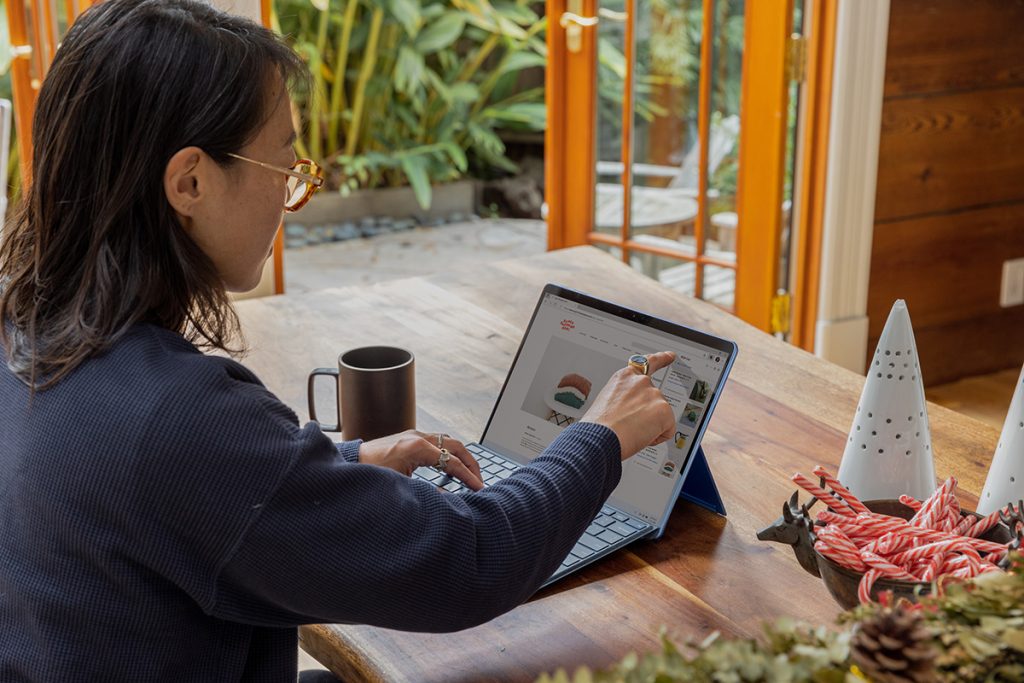When you’re looking into mobile computing, you’re faced with a choice. There’s the classic laptop computer model: a screen with a case that also incorporates a keyboard and trackpad as standard.
Then there’s tablets.
You might think that they started out with Apple’s iconic iPad as devices purely for idle web surfing or gaming, but tablet devices were being sold as productivity devices years before the first iPad rolled off the production line.
Microsoft had a tablet-specific version of Windows XP on store shelves in 2002, some 8 years before the first iPad went on sale.
In recent years there’s been an even bigger push for tablet computing to be viewed as “proper” computers, providing a range of features designed to make them more compelling for everyday use.
The reality here, just to spoil the headline is that yes, you can replace a laptop with a tablet for many tasks. Whether that’s a good idea is a rather more variable matter, depending on your needs and your budget.
I’m not going to advocate for one over the other, because it really can vary a lot. What can be useful is knowing where each type of device can shine, and where the weaknesses are for tablets and laptops alike.
One quick explainer before I start, however.
Microsoft – and some of its device partners – also have tablets such as the Surface Pro line that often get muddled in with Apple’s iPad line or Android tablets.
Physically, they’re all “tablets”, but in the case of the Surface Pro it’s more akin to a full Windows Laptop with the keyboard cut off than a “tablet” in the iPad sense.
There’s a lot to like about the Surface Pro for sure, but it’s very much a halfway approach between a laptop and a tablet. What I’ll be considering here is more classical tablets – Apple’s iPads or Samsung’s Galaxy Tab, for example – versus laptops.

Aren’t they all computers anyway?
Yes, that’s true, and in fact the line between a tablet and a laptop is one that’s been considerably blurred in recent times with devices like Apple’s iPad Pro, which uses the same processors as its MacBook lines or Microsoft’s Surface Pro line, which runs Windows just like a laptop does.
What are the benefits of a tablet?
Portability
Most tablets are built thin and light with portability a key consideration. You can get laptops that weigh in at just under 1kg, but these are very expensive machines. A basic laptop is likely to run somewhere around 1.2-1.5kg on average.
Comparatively, an iPad Air weighs in at 462 grams, which is very light indeed.
Good for artists (or people who hate keyboards)
The basic tablet interface is touch-centric first, with many supporting optional stylus use for making notes or more artistic endeavours. You absolutely can get arty with a basic laptop, but then you’re typically drawing with a mouse or trackpad, which is nowhere near as creatively engaging.
Good battery life
There’s no hard and fast rule here, but the more controlled scope of most tablet devices means that they can be very battery efficient relative to their price.
Plenty of “proper” computer apps
In the early iPad days, you were stuck with just Apple’s own iWork suite for getting document work done on a tablet. It wasn’t great, to put it mildly. These days, there are full versions of Office 365, most Adobe Creative Suite apps and plenty more to keep you working away without a pause.
Controlled environment can make them safer
With one caveat, a tablet is likely a more secure environment and less prone to issues with viruses and malware than a straight laptop equivalent. That’s because you don’t have direct access to the actual programming or operating system behind the tablet as you do on a full laptop.
The caveat there are the Surface Pro devices – or other Windows tablets – because they’re full Windows devices. That can make them even more capable… but that does include capable of being infected along the way.
Don’t think, by the way that just because you’re on a tablet that you can’t fall foul of other perils such as identity theft or online shopping scams for example. A dodgy link in an email on your iPad could still lead you into trouble. It’s just not typically the kind of trouble that leads to needing to wipe a virus off your device.

What are the limitations of a tablet?
Limited multitasking
Again, with the Surface excluded as it’s full Windows, if you’re looking to study or work off an iPad or Android tablet, you’re going to find it a little bit harder to run multiple apps side by side or with shared data between them.
This has improved over the years with many tablets able to multi-task two or sometimes three apps without too much trouble – but that’s limited compared to the very many more you can run on a full laptop.
Controlled environment can limit app access
If you’re using an iPad or an Android tablet, you’re largely limited to the app stores for those devices when it comes to getting apps onto the device. That means that they have to pass approval by Apple and Google respectively.
There’s a wide array of app choices, but they’re utterly dwarfed by the choices available on full computer platforms. It’s worth doing your research if you use very specific software packages, because even if they are available on your tablet of choice, the feature set can vary quite a lot when they come to the tablet versions.
Limited expandability
Most tablets these days come with just a single port for both power and any kind of peripheral connection. The good news here is that you can generally plug in devices like external hard drives to most tablets and have them work.
The bad news is that you’re then using up the one port you’ve also got to keep it charged, and it can get tricky juggling devices or USB hubs, not all of which will work smoothly with every tablet device.
While a lot of laptops use sealed components so you can’t quite as easily upgrade internal components on some models, it’s still possible on others, and most ship with numerous expansion ports for external drives, screen connections and networking needs.
They can get more expensive quickly
Many folks figure that tablet computing will be right for them because a lot of tablets are considerably more affordable than a regular laptop.
That may be true depending on the model you choose – though not for the Surface Pro or the Apple iPad Pro in many configurations – but you’ve got to consider what you’re not getting.
Most models ship without a clip-on keyboard or trackpad accessory. If you want the official models of those you’ll have to pay more to do so.
Want a stylus? Check carefully, because most devices (including all iPads) treat that as extra cost as well.
Need help with your new laptop or tablet?
Geeks2U can help set up your new laptop, transfer and backup data from your old device to your new device and install antivirus software. Get in touch with us today to see how we can help get your new device up and running as intended.
or complete our form today to set up an appointment with a computer repair technician




